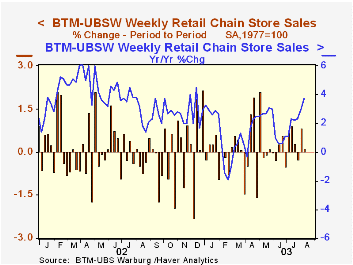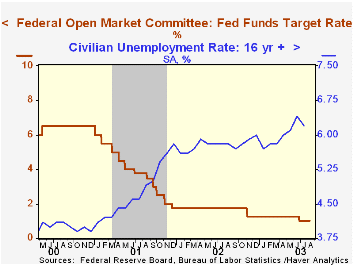 Global| Aug 12 2003
Global| Aug 12 2003Chain Store Sales Tick Higher
by:Tom Moeller
|in:Economy in Brief
Summary
Chain store sales ticked 0.1% higher last week according to the BTM-UBSW survey. The mailing of tax-rebate checks, state tax holidays and the beginning of the back-to-school shopping season likely encouraged sales. The small advance [...]

Chain store sales ticked 0.1% higher last week according to the BTM-UBSW survey. The mailing of tax-rebate checks, state tax holidays and the beginning of the back-to-school shopping season likely encouraged sales.
The small advance in the first full week of August pulled the level of sales so far this month 1.1% above the July average. July sales rose 1.4% from June.
During the last five years there has been a 62% correlation between the year-to-year percent change in chain store sales and the change in nonauto retail sales less gasoline.
The BTM-UBSW retail chain-store sales index is constructed from the sales results reported by seven retailers: Dayton Hudson, Federated, Kmart, May, J.C. Penney, Sears and Wal-Mart.
| BTM-UBSW (SA, 1977=100) | 8/9/03 | 8/2/03 | Y/Y | 2002 | 2001 | 2000 |
|---|---|---|---|---|---|---|
| Total Weekly Retail Chain Store Sales | 428.3 | 427.7 | 3.7% | 3.6% | 2.1% | 3.4% |
by Tom Moeller August 12, 2003

The Federal Reserve left the target rate for federal funds unchanged at 1.00%. The discount rate also was left unchanged at 2.00%.
The unanimous action was as expected by economists.
The press release which accompanied the Fed’s action contained the following statement. "The Committee continues to believe that an accommodative stance of monetary policy, coupled with still-robust underlying growth in productivity, is providing important ongoing support to economic activity. The evidence accumulated over the intermeeting period shows that spending is firming, although labor market indicators are mixed. Business pricing power and increases in core consumer prices remain muted."
With regard to the risks to the economic outlook, the Fed stated that "the upside and downside risks to the attainment of sustainable growth for the next few quarters are roughly equal. In contrast, the probability, though minor, of an unwelcome fall in inflation exceeds that of a rise in inflation from its already low level. The Committee judges that, on balance, the risk of inflation becoming undesirably low is likely to be the predominant concern for the foreseeable future."
Here is the complete text of the Fed's latest press release.
Analysis from the Federal Reserve Bank of St. Louis titled "Alternative Policy Weapons?" can be found in this link.
Tom Moeller
AuthorMore in Author Profile »Prior to joining Haver Analytics in 2000, Mr. Moeller worked as the Economist at Chancellor Capital Management from 1985 to 1999. There, he developed comprehensive economic forecasts and interpreted economic data for equity and fixed income portfolio managers. Also at Chancellor, Mr. Moeller worked as an equity analyst and was responsible for researching and rating companies in the economically sensitive automobile and housing industries for investment in Chancellor’s equity portfolio. Prior to joining Chancellor, Mr. Moeller was an Economist at Citibank from 1979 to 1984. He also analyzed pricing behavior in the metals industry for the Council on Wage and Price Stability in Washington, D.C. In 1999, Mr. Moeller received the award for most accurate forecast from the Forecasters' Club of New York. From 1990 to 1992 he was President of the New York Association for Business Economists. Mr. Moeller earned an M.B.A. in Finance from Fordham University, where he graduated in 1987. He holds a Bachelor of Arts in Economics from George Washington University.
More Economy in Brief
 Global| Feb 05 2026
Global| Feb 05 2026Charts of the Week: Balanced Policy, Resilient Data and AI Narratives
by:Andrew Cates






